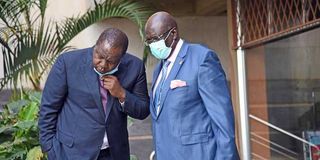Why schools reopening is no walk in the park

President Uhuru Kenyatta’s directive on reopening of schools, offers an opportunity to rethink the options and bring on board the views of more players in the education sector.During the Madaraka Day address, President Kenyatta directed the Interior and Education ministries to work on guidelines and protocols, on the gradual reopening of places of worship and schools.However, reopening of schools will be no walk in the park if recommendations by health and education experts are anything to go by.Last week, multiagency report by the Kenya National Union of Teachers (Knut) and four other organisations advised against reopening of schools and recommended that the national examinations, scheduled for October and November, be moved to the first quarter of next year.INFECTION CURVEThe other agencies involved in the preparation of the report were: the Universities Academic Staff Union (Uasu), the Kenya Human Rights Commission (KHRC), Forum for African Women Educationalists and the Kenya Medical Practitioners, Pharmacists and Dentists Union.“Viably, schools cannot report until September,” the report notes, urging that the government should first ensure the Covid-19 curve of infections is flattened to assure safety of teachers, support personnel and learners.A team of doctors and public health experts from Moi University College of Health Sciences, had warned that, while education is a central activity in a child’s life, it is impossible to engage in education, if one’s health is not at its optimum.“Kenya is yet to see a flattening of the curve as cases of Covid-19 increase gradually, since the confirmation of the first case on March 13.”The health experts cite South Korea, Finland, France, China and Denmark as examples of countries which saw a spike in cases linked to the reopening of schools.BIGGEST CHALLENGEBesides, the team observes, opening schools would present several challenges. All students and teachers would be required to be tested and each school would have to purchase enough thermometers, to check every person’s temperature.In addition, all students and staff would have to be provided with masks, ensuring proper use and regular changing, and authorities would need to ensure adequate supply of water, soap and sanitiser in all schools.The biggest challenge would be ensuring social distancing as most schools are crowded, and children are social by nature. Travelling to and from school using public means would also put children at risk of infection.On its part, Uasu, recommends a phased approach to the reopening of higher education institutions “after a demonstrated reduction in the number of new cases of Covid-19.”In the first phase, all education institutions should establish a Covid-19 response committee to oversee phased reopening, including conducting assessments to ensure the required facilities are in place.The second phase would entail ensuring sufficient resources for maintaining social distancing, testing, contact tracing and isolating new cases in every public university.“Academic staff must be allowed to decide whether e-learning would be used or whether it can be blended with face-to-face lectures,” Uasu notes.Phase three would entail preventing the spread of the virus in campuses by protecting the elderly staff, who are most at risk, as well as those with underlying conditions.FUNDINGThe union also wants funding to public universities increased by Sh35 billion to support research, ICT infrastructure, social distancing measures and remuneration.Overall, the multi-agency report calls for a framework to manage the schools’ reopening process.“A decision on reopening of schools is a step-wise process that requires skilful, careful and cautious selection to deal with situations prior to reopening, during the re-opening and management of the schools once they are reopened,” it notes.The multiagency team calls on the government, with support of stakeholders, to prepare critical policies, procedures and financing plans needed to improve schooling, with a focus on safe operations, including strengthening remote learning practices.They want the government to adopt proactive approaches to reintegrate marginalised and out of school children, invest in water and sanitation and hygiene and to focus on remedial education to compensate for lost time.“With schools reopened, a mechanism to actively monitor health indicators, expanding focus on well-being and protection should be implemented,” the agencies add.ADEQUATE SPACE The report recommends that, moving forward, the government should engage teachers, non-teaching staff and parents on how to reopen schools.It also calls on the government to promote the World Health Organization’s recommended safety facilities in schools and to provide sustainable supply of personal protective equipment for teachers, workers and learners.Schools should create adequate space for social distancing, and teachers and support staff should be trained on Covid-19 compliant pedagogy, including support for gender, those with disabilities, vulnerable groups and Covid-19 survivors.The agencies also want more teachers and school workers recruited to support the expected intensive teaching and learning.The report was informed by several surveys capturing the views of, among others, 33 Knut branches and Early Childhood Development and Education, primary and secondary school teachers and an analysis by Uasu technical committee on Covid-19 and its ramifications on the education sector.It also relied on an expert analysis by Dr Florentius Koech-led team of doctors and health experts and a scan of global perspectives on schools’ re-opening from unions in the diaspora.


